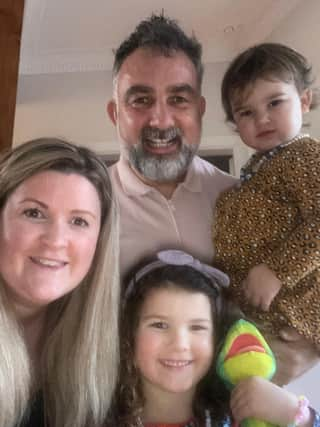‘I call this country home – but I feel like a prisoner’ - Scots living under New Zealand’s stringent Covid rules


“I know I chose to move to the other side of the world,” says school nurse Ms Hunt, who moved to Auckland in 2009, where she lives with her husband, Stewart and daughters Darcy, 5 and Billie, 2.
“I call this country home and I know it’s far away from family and I choose to live here - but I didn't choose to live here and not be able to see my family or my friends again. I feel like a prisoner, not having the choice to get on a plane and see my family.”
Advertisement
Hide AdAdvertisement
Hide AdTravelling outside the country – and more importantly, back home again - is still almost impossible for most New Zealanders : even more so since last week when Prime Minister Jacinda Ardern raised the alert level to red amid warnings of a tidal wave of Omicron.


In March 2020, Ms Ardern closed New Zealand’s borders to almost all non-citizens or residents. Single cases of Covid were cracked down on heavily, with cities going into strict lockdowns at a hint of community transmission.
For a long time, the strategy appeared to be working, with New Zealand registering just 15,991 cases since the pandemic began – most of them detected while patients were in isolation in managed quarantine - and only 52 deaths. In the early days of the pandemic, Scotland looked to the country – which, with its small population and female leader, drew many parallels to Scotland – with envy. While Scots were locked down, unable to leave their homes for more than an hour a day, most New Zealanders enjoyed freedom, attending busy events and mixing in restaurants, cafes and nightclubs without worry.
Yet two years on, any New Zealanders returning home from abroad still have to pay to stay in quarantine hotels for two weeks to ensure they are not infected with Covid, before being allowed to mix with the general population. Places in the hotels – known as Managed Isolation and Quarantine (MIQ), are limited and anyone planning to travel has to apply through a lottery system, with no guarantee of getting a slot.


However, on New Zealand’s move to “red alert” last week, the release of any new blocks of MIQ were suspended indefinitely amid fears over the spread of Omicron. A statement from the New Zealand government said there will be more room releases “in the future”, but did not specify a date when the system would resume.
"Managed isolation is too expensive for us to consider, even if we were able to get it,” says Ms Hunt, who is originally from Portobello, Edinburgh. “It's over $3,000 (£1,600) per person. Even if you could pay, you don’t even know if you would get MIQ, it's almost like a competition or a lottery to see if you can get a slot. At the moment, it isn’t open due to the spread of Omicron and we don't know when that will change.”
She adds: "The children speak to their grandparents online, but it’s difficult - my five-year-old just can't connect. She needs to have that face-to-face contact, or touch, to have the person in front of her, not the screen. She knows who they are, but she she can't really talk to them like she would if she saw them in person.
"I feel like I’ve missed so much – since the pandemic began, my mum and dad have both turned 70 and my brother has become a dad. Hopefully this year, at some point, I will be able to see my family.”
Advertisement
Hide AdAdvertisement
Hide AdFor Hannah Smith, 43 - who moved from Edinburgh to Wellington just weeks before the pandemic hit - leaving New Zealand for a trip back to the UK would mean she would not be able to return.
"I am not due to get my full residency until the summer and until that time, if I leave the country, I will not be allowed back in,” says Ms Smith, who works as a third sector consultant. “I have that marked with a big circle on my calendar as the first time I could consider a return trip to the UK.
"Obviously, if something big happened at home and I had to leave before then, I would, but I would struggle to give up the life I have built here with no prospect of returning to it – my job and my home. My mum can’t understand, she keeps asking me why I don’t just come home.”
New Zealanders are also bracing themselves for a wave of Omicron they have been told by their government is now inevitable. New, stricter self-isolation rules have been brought in which mean if someone is found to be positive for Covid, they must stay at home for 14 days, along with their household, who also have to isolate for an extra ten days beyond the quarantine of the first positive case.
"When I got the red alert message on my phone, I happened to be on my way to the supermarket,” recalls Ms Smith. “While I was in there doing my shop, it seemed like everyone had got the message at home and gone straight there to panic buy. For people like me, with links to the UK, we know people who have had Covid and got through it. To people from here who don’t have those links, it feels very new and frightening.”
She adds: “But there is a feeling from some people that the government is being too cautious.”
While panic buying toilet rolls and tinned goods feels like a long-ago 2020 memory for Scots, for most New Zealanders, the idea of high Covid case numbers – and the resulting impact on society - is still a novelty.
Jo Moir, political editor of New Zealand news website, Newsroom, wrote this week: “Despite two years of lockdowns, borders and restrictions, a large chunk of the population still doesn’t know anybody who has ever had Covid, and views it as something happening to other countries through the distance of a television screen.”
Advertisement
Hide AdAdvertisement
Hide AdShe added: “The fortunate position New Zealand has been in is about to come to a crushing end.”
Kiwi Ereti Mitchell, who lives in Scone, Perthshire, is watching her compatriots on the other side of the world tackle Covid with interest. Fear over the expected outbreak and resulting restrictions, combined with the rising cost of living, has seen support for Ms Ardern drop to its lowest level since she became leader in 2017.
"In my home town, Gisborne, which is 30,000 people, there is one case and it is all over the news,” she says. “Everyone is getting worried about one case. But it is starting to creep in. I think New Zealand has to learn to live with Covid, just like us.
"People there are pretty cheesed off. Everything was so tight and they thought it would be OK by keeping it out, but you can’t now, it’s not going to stay away. There are a lot of people very unsettled about the restrictions, they thought they would be free by now, but it hasn’t eradicated the problem, it’s still there.”
Ms Mitchell, 71, the president of the New Zealand Society Scotland, says the travel difficulties have brought home how far away New Zealand is. She has lived in Scotland for 47 years since visiting initially on a one-year working visa and used to visit family - or be visited by them – regularly.
"It used to be you could just jump on a plane and you were there,” she says. “It didn’t feel far away. Now, that’s just not possible. I miss my family, we do speak, but it’s not the same. I haven’t seen anyone from home for two years. New Zealand is just not letting people in.
"They will just have to get on with things eventually, they can’t lock it out forever.”
A message from the Editor:
Thank you for reading this article. We're more reliant on your support than ever as the shift in consumer habits brought about by Coronavirus impacts our advertisers.
If you haven't already, please consider supporting our trusted, fact-checked journalism by taking out a digital subscription.
Want to hear more from The Scotsman's politics team? Check out the latest episode of our political podcast, The Steamie.
It's available wherever you get your podcasts, including Apple Podcasts and Spotify.
Comments
Want to join the conversation? Please or to comment on this article.
